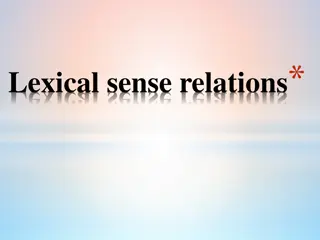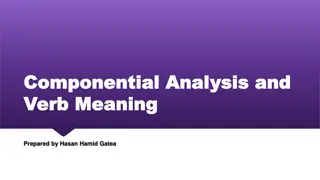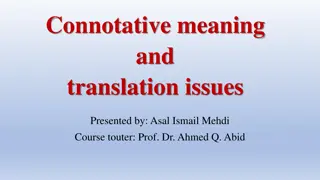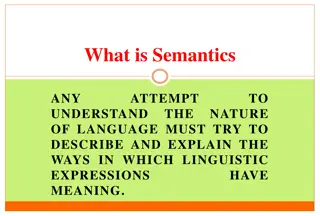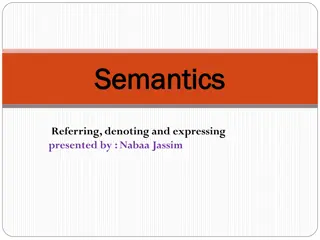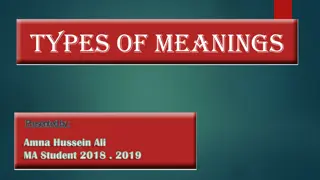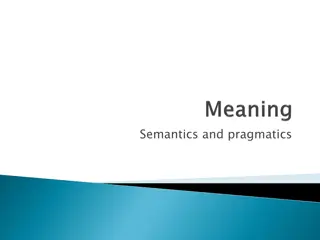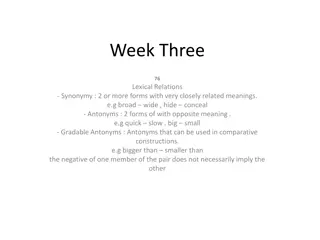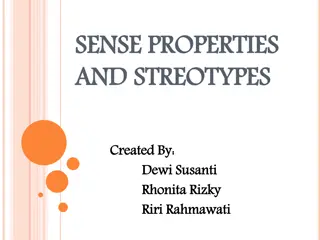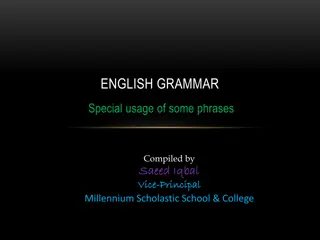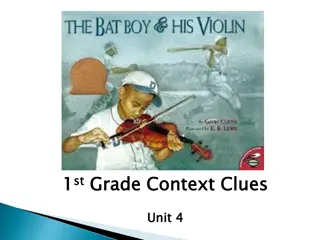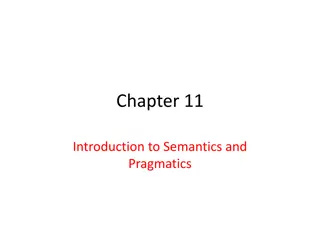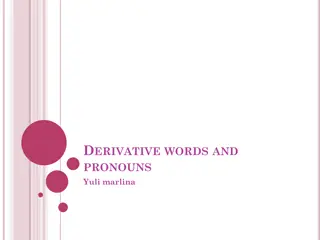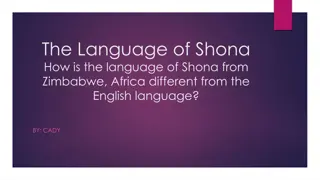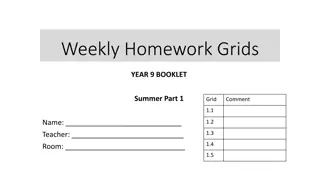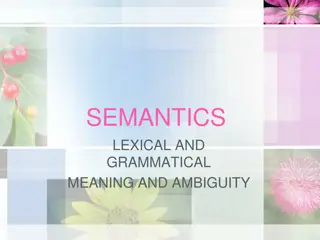Lexical Semantics
Delve into the intricacies of word meanings, from basic definitions like lexeme and lexicon to possible word relations such as homonymy, polysemy, synonymy, and more. Understand how words combine to form sentences and how their meanings contribute to discourse analysis.
0 views • 46 slides
Vocabulary Lesson Highlights and Word Meanings by Abdullah Ahmad
Explore a vocabulary lesson presented by Abdullah Ahmad, a former ex-vice principal and senior English teacher. Dive into the meanings of words like procession, profound, initiatives, poaching, and intricate through engaging visuals and sentences. Enhance your language skills with this insightful le
1 views • 85 slides
Understanding Medical Terminology: Suffixes and Their Meanings
Dive into the realm of medical terminology suffixes and their significance in altering the meanings of terms. Explore various types of suffixes like grammatical, diagnostic, pathological, surgical procedure, and disease-related. Learn examples of noun suffixes and their definitions, shedding light o
2 views • 12 slides
Understanding Semasiology: The Study of Word Meaning
Semasiology is a branch of linguistics focused on the meaning of words. It delves into various aspects of lexical meaning, semantic development, polysemy, and semantic structure. Through exploring types of word meanings and semantic changes, semasiology helps us comprehend the intricate nuances of l
4 views • 19 slides
Understanding Road Signs and Safety Measures
Road signs are essential for providing guidance and ensuring road safety. They convey important information about regulations, warnings, and directions to motorists and pedestrians. Understanding the meanings of various road signs is crucial in navigating roads safely. This guide explores different
0 views • 6 slides
Understanding Lexical Sense Relations and Word Meanings
Investigating sense relations between words involves exploring synonyms, antonyms, hyponymy, and meronymy to understand the meanings of words in different contexts. By examining semantic similarities and syntactic relationships, one can better comprehend how words relate to one another, leading to a
1 views • 28 slides
Understanding Componential Analysis in Semantics
Componential analysis is a significant theory that emerged in the 20th century to analyze words based on semantic features. It helps identify word meanings by examining components and their features. This method involves representing features as either positive (+), negative (-), or unspecified (.).
0 views • 22 slides
Evolution of English Literature: From Old English to Beowulf
The English language, evolving over 1,400 years, transitioned from Old English to Middle English with works like Beowulf standing as a pinnacle of Old English literature. The epic poem tells the tale of Beowulf's heroic feats in pagan Scandinavia, showcasing elements of alliteration, a key literary
0 views • 46 slides
Understanding Surat Al-Balad: Themes and Meanings
Surat Al-Balad is the 90th chapter of the Quran, revealed in Makkah. It emphasizes the importance of faith, distinguishing between good and evil, and the rewards for believers. The surah reflects on human nature, the concept of struggle, and the responsibility towards others, highlighting the signif
0 views • 15 slides
Exploring Pragmatics in Linguistics Studies
Pragmatics delves into the study of implied meanings and how we interpret language in various contexts. It focuses on understanding communication beyond explicit words and explores the invisible meanings conveyed through situational and linguistic contexts. Deixis, physical context, and linguistic c
0 views • 41 slides
Understanding Connotative Meaning and Translation Issues
Exploring the complexities of connotative meaning within texts, this article discusses the various types of connotative meanings and the challenges they pose for translation. It delves into attitudinal, associative, and affective meanings, emphasizing the importance of recognizing and preserving the
1 views • 17 slides
Understanding Ambiguity in English Language
Exploring the concept of ambiguity in the English language, this article delves into the various meanings words can convey, the challenges of ambiguity resolution, and the types of ambiguity such as lexical and structural ambiguity. Examples of homonymy and homophony are provided to illustrate how w
2 views • 27 slides
Understanding Semantics: The Study of Meaning in Linguistics
Semantics is the scientific study of meaning in language, delving into questions about definitions, ideas, objects, relations between meanings, and how meanings interact with syntactic rules. Exploring the vagueness of the term "meaning," semanticists explore sense, reference, denotation, and connot
2 views • 19 slides
Understanding Semantics: Exploring Linguistic Meaning and Expression
Exploring the realm of semantics, this content delves into how language is used to refer, denote, and express concepts in the world. It discusses the importance of linguistic meaning, different approaches to studying it, and the distinction between denotational and cognitive semantics. By examining
0 views • 7 slides
Importance of Teaching English at Different Education Levels
English language holds a significant position in the educational system and national life of India. This presentation by Dr. A. Mary Delphine highlights the aims and objectives of teaching English, emphasizing its importance in India and the modern world. The objectives include understanding the rat
1 views • 32 slides
Enhancing Vocabulary Skills Through Synonyms and Antonyms Practice in English
Explore a series of passages focusing on enhancing vocabulary skills by identifying synonyms and antonyms in English language usage. Engage with exercises that challenge your understanding and application of word meanings, offering insights into expanding your linguistic proficiency. Practice contex
0 views • 12 slides
Types of Meanings Explored in Linguistics
Various types of meanings in linguistic communication are discussed, including conceptual, connotative, affective, and illocutionary meanings. These meanings play a crucial role in language structure and communication, helping us understand the complexity of language semantics and expression.
0 views • 26 slides
Understanding Semantics and Pragmatics in Language Study
Semantics and pragmatics are key areas of language study that focus on the meanings of words, phrases, and sentences. Semantics delves into the literal meanings and language as a system, while pragmatics explores how speakers use language in context. Understanding semantic meaning involves consideri
3 views • 77 slides
Understanding Denotative Meaning and Translation Issues
Denotative meaning in translation poses challenges due to the elastic and indeterminate nature of meaning, especially in dealing with the cognitive or literal sense of words. Polysemy, homonymy, and synonymy contribute to complexities in determining precise denotative meanings. The rigidity and flex
0 views • 40 slides
Understanding Lexical Relations in Linguistics
Different types of lexical relations such as synonymy, antonyms, hyponymy, homophony, and homonymy play a crucial role in understanding the nuances of language. Synonyms have closely related meanings, antonyms have opposite meanings, while hyponymy and hypernymy show hierarchical relationships betwe
0 views • 4 slides
Latin Words and Their Meanings in Images
Explore the beauty of Latin language through images depicting various words and their meanings, from expressions like "vultus" (face) to actions like "demitto" (to send down) and concepts like "novitas" (newness). Each image showcases a word and its English translation, providing a visual journey in
0 views • 40 slides
Understanding Words: Meaning and Usage Lessons
Explore the topic of word meanings with Anwar Sir in Class-8 English Lesson. Learners will develop skills in using a dictionary, identifying different meanings, and providing examples. Engage in activities and discussions to enhance vocabulary knowledge.
0 views • 11 slides
Understanding Lexical Relations in Language
Explore the concepts of synonymy, antonymy, hyponymy, and prototype in linguistics. Learn about words with closely related meanings (synonyms), opposite meanings (antonyms), inclusive meanings (hyponyms), and characteristic examples (prototypes) within lexical relations.
0 views • 12 slides
Understanding Sense Properties and Stereotypes in Language
Effective communication hinges on shared meanings of words. Disagreements over word meanings can hinder understanding. Analyzing examples like distinguishing between "killed" and "dead" showcases how language's sense properties shape communication. Exploring analytic, synthetic, and contradictory se
0 views • 14 slides
Interactive English Lesson on Family and Professions
Join the engaging English lesson featuring Atiya Jaman and Assistant Teacher Chander Hat from the Government Primary School in Kurigram. Explore topics like Sagar and His Family, vocabulary meanings, stress patterns, reading passages, and group discussions. Enhance your English skills through intera
0 views • 18 slides
Special Usage of Phrases in English Grammar Compiled by Saeed Iqbal
This compilation by Saeed Iqbal focuses on special usage phrases in English grammar, such as "as if" and "as though," explaining their meanings, tenses, and examples. It also covers the usage of "as soon as" as a conjunction, its position in a sentence, and how to use the present simple tense with i
0 views • 29 slides
Discovering Word Meanings Through Context Clues in 1st Grade
Explore the use of context clues and visual aids to understand word meanings in a 1st-grade unit on context clues. Through engaging activities and images, students learn to infer word meanings from text and pictures. Practice identifying clues and describing words like "howl" and "clumsy" to enhance
0 views • 17 slides
Understanding Semantics and Pragmatics: Exploring Extensions of Meaning
This chapter delves into the realms of semantics and pragmatics, exploring literal and non-literal meanings, naturalized, established, and nonce extensions, as well as metaphor and metonymy. It discusses how certain meanings become entrenched in language, either as naturalized or established extensi
0 views • 18 slides
Understanding Derivative Words and Prefixes in English Language
Delve into the world of derivative words, prefixes, and pronouns with insights on basic terms, the definition of prefixes, common prefixes in texts, prefixes' meanings and connotations, derivational suffixes, and a list of English words of Indonesian origin. Explore the modification and creation of
0 views • 21 slides
Contrasting Shona and English Languages in Zimbabwe
The language of Shona in Zimbabwe, Africa, differs from English in various aspects such as script symbols, alphabet, official usage, borrowing of words, and number of speakers. Shona has a script with 35 symbols, while English has a 26-letter alphabet. English is the official language of the USA, wh
0 views • 5 slides
Influence of Indian English in "The Jewel in the Crown" by Rochana Jayasinghe
Indian English plays a significant role in the Indian subcontinent with 200 to 333 million English speakers. India is a key player in the English language landscape, publishing more books in English than any other language. The British Raj from 1858 to 1947 shaped the prominence of English in India,
0 views • 18 slides
Complete Your Year 9 English Weekly Homework with Ease
Enhance your English skills with guided weekly homework grids covering spelling, grammar, punctuation, vocabulary, reading comprehension, and language techniques. Learn to identify homophones, correct spelling errors, understand word meanings, and more through engaging tasks. Challenge yourself with
0 views • 13 slides
The Extension Dogma: Exploring Meaning and Extensions in Linguistic Expressions
The Extension Dogma challenges the assumption that linguistic expressions inherently possess meanings. Instead, it posits that expressions have extensions without necessary meanings that determine them. Theories of meaning should focus on the extensions of expressions, while psychological studies of
0 views • 30 slides
English Lesson on Mita's Day for Class Four Students
In this English lesson, students will learn about Mita's Day in Unit 14. The teacher introduces new words with meanings and engages students in activities like model reading. Students will also identify and describe pictures, practice new vocabulary, and discuss daily routines. The lesson aims to en
0 views • 22 slides
GCSE English Language and Literature Overview
GCSE English Language and Literature subjects are led by Mrs. A. Baker and Mr. Doodson. English Language is examined by OCR, while English Literature is examined by Edexcel. Both subjects have two examination papers worth 100% of the grade. English Language papers focus on reading and writing skills
0 views • 14 slides
Choosing the Right English Course for Your HSC: Advanced, Standard, or Studies?
When preparing for the HSC, selecting the appropriate English course is crucial as it is compulsory. Options include Advanced English, Standard English, and English Studies, each offering unique benefits. Advanced English challenges students with higher-order thinking skills, while Standard English
0 views • 25 slides
Understanding Homonymy in Lexical Semantics: Examples from English and Arabic
Explore the concept of homonymy in lexical semantics through examples in both English and Arabic languages. Homonymy refers to words that share the same form but have unrelated meanings, leading to ambiguity in communication. Examples of homonyms in English and Arabic showcase how words can have mul
0 views • 27 slides
Unlocking the Power of Greek and Latin Roots in English Vocabulary
Understanding Greek and Latin root words in English can significantly enhance your vocabulary skills. By recognizing these roots, you can decipher unfamiliar words, expand your language proficiency, and grasp the meanings of various terms. This knowledge not only aids in English fluency but also pav
0 views • 10 slides
Interactive English Lesson on Teacher's Identity and Learning Outcomes
Explore the role of a teacher named Rupok Talukder, as an assistant teacher at Goninagor Shologram High School in Sunamganj. Discover the learning outcomes for students in English class and engage in activities like discussing pictures, reading texts, and matching words with meanings. Enhance your E
0 views • 14 slides
Understanding Semantics, Lexical, and Grammatical Meaning
Exploring the nuances of semantics, lexical meaning, and grammatical meaning, this content delves into the distinctions between them, the role of lexemes, and the complexities associated with words. It discusses the various kinds of meanings expressed at the lexical and grammatical levels, including
1 views • 37 slides





